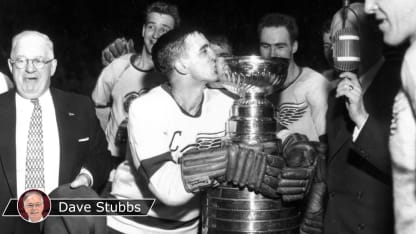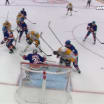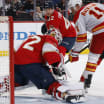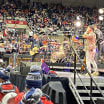I have probably seen hundreds of photos of
Ted Lindsay
in the uniforms of the Detroit Red Wings and Chicago Black Hawks, his face dripping or caked with blood, the frayed wool of his sweaters shredded by slashing sticks and clutching fists.
Lindsay was legend on, off ice for Red Wings
'Terrible Ted' lived unrivaled hockey life before giving back to sport he loved

By
Dave Stubbs @davestubbs.bsky.social
NHL.com Columnist
I have seen Lindsay dressed in formal wear for banquets, the deep valleys of his battle-scarred face a stark but somehow beautiful contrast to his elegant suits.
RELATED: [Lindsay, Red Wings icon, dies at 93 ]
I have seen him in slacks and golf shirts for his charity tournaments, and in sweatpants and a sweatshirt for casual lounging.
But there was nothing that could have prepared me for the man who opened the door to his Las Vegas hotel suite in June 2017, "Terrible Ted" Lindsay, in his bathrobe, having invited me for breakfast to avoid the hubbub of the casino many floors below.
A month shy of his 92nd birthday, he was in town for the 2017 NHL Awards, on hand for an eighth consecutive year to present the Ted Lindsay Award, voted by NHL Players' Association members to the athlete it had chosen as the most outstanding player in the NHL. Formerly the Lester B. Person Award, it was named after Lindsay in 2010.
Lindsay, who died Monday at 93, would present the trophy that night, alongside Mario Lemieux and Mark Messier, to Edmonton Oilers center Connor McDavid. It would be the last time Lindsay would hand out his award, his health too fragile this past June to allow him to attend the ceremony in Las Vegas. McDavid again was voted the winner.
Video Player is loading.
Current Time 0:00
/
Duration 0:00
Loaded: 0%
Stream Type LIVE
Remaining Time -0:00
1x
- Chapters
- descriptions off, selected
- captions settings, opens captions settings dialog
- captions off, selected
This is a modal window.
Beginning of dialog window. Escape will cancel and close the window.
End of dialog window.
This is a modal window. This modal can be closed by pressing the Escape key or activating the close button.
Red Wings legend Ted Lindsay dies at 93
"I'm honored to have my name on a trophy to the game I loved and still love, and will do anything for, if I can, in the twilight years of my life," Lindsay said that June morning.
"As long as I can keep in good health I'll do whatever I can and stay involved however I can. Hockey is the greatest game in the world, bar none. You don't hide when you get on the ice. You can't hide. You either show that you've got something, or you don't have anything."
Lindsay had, well, everything.
He was a small but highly explosive keg of dynamite. Lindsay won four Stanley Cup championships with the Red Wings during a 17-season, 1,068-game career --14 with Detroit, three with Chicago -- and won the 1949-50 Art Ross Trophy as the League's top scorer with 78 points. He was named one of the 100 Greatest NHL Players in 2017.
At 5-foot-8 and 163 pounds, he forever was the smaller dog in the fight, but no matter. His 1,808 penalty minutes gifted him one of the most distinct faces in hockey history, deep valleys carved into his mug by scraps from which he never backed down, even if he had to climb a ladder to get at the hulking opponent who with poor judgment wanted a piece of him.
"I loved the corners," said Lindsay, who had 851 points (379 goals, 472 assists) in the NHL. "That's where you found men. You found more chickens. You knew who the chickens were on the other team because they'd always back off a little bit. If I was coming they knew they were going to get lumber or elbows or anything. They were going to get into the screen [before there was glass]."
As we sat at breakfast, the baked Vegas landscape stretching out forever beyond his window, Lindsay spoke with soaring pride of his father, Bert, a goaltender in the pre-NHL National Hockey Association, who enjoyed success in Renfrew, Ontario, but lost everything in the Great Depression and moved his family of nine children north to Kirkland Lake and the impressive gold mines there.
It was in northern Ontario that Ted Lindsay fell in love with hockey and the Red Wings, the strong radio signal of WJR carrying from Detroit on cold winter nights.

Video Player is loading.
Current Time 0:00
/
Duration 0:00
Loaded: 0%
Stream Type LIVE
Remaining Time -0:00
1x
- Chapters
- descriptions off, selected
- captions settings, opens captions settings dialog
- captions off, selected
- Unknown Captions
This is a modal window.
Beginning of dialog window. Escape will cancel and close the window.
End of dialog window.
This is a modal window. This modal can be closed by pressing the Escape key or activating the close button.
Remembering Red Wings legend Ted Lindsay
"They had two defensemen, Jack Stewart and Jimmy Orlando, who were tough and dirty, and that was my type of hockey," Lindsay said wistfully. "I would wind up with Detroit to have a wonderful career and a wonderful life."
He would dissolve into tears speaking about his late wife, best friend and soulmate, Joanne, whom he had lost to cancer almost four months earlier after 27 years of marriage. There is no room large enough to hide in when one of the toughest men in hockey is weeping inconsolably.
"When I think of Jo, well, I try to keep away from it, but I'm getting better," he said finally, wiping his tears on the arm of his robe. "She'll never leave me. She was a gem, a real gem. She was good and she still is good. She's still with me."
When Terrible Ted saw good to be done, he did it. He was late arriving for an April 2016 interview we had planned at Joe Louis Arena, shuffling in finally with an armload of sticks and pieces of equipment he had harvested from the Red Wings dressing room for his annual charity golf tournament.
That event, and many others, directed proceeds to the Ted Lindsay Foundation, which he created in 2001. It was when the son of family friend John Czarnecki was diagnosed with autism that Lindsay focused on research and support for those afflicted and their families.
His foundation's mission: "To raise money and funds to support research and educational programs, focusing on the cause and management of autism spectrum disorders."
More than $4 million has been raised by Lindsay and his partners.
In late 2016, he was positively beaming while attending the official opening of the Ted Lindsay Foundation HOPE Center in Southfield, Michigan. A $1 million donation from his fund-raising efforts had played a huge role in the creation of the building, a sprawling, state-of-the-art facility that offers speech pathology and other services to children with autism spectrum disorders and other learning and developmental disorders.
"There are many medical terms and I'm not smart enough to understand them, so I'll just keep working at it," Lindsay said, smiling. "The one thing I know how to do is raise money."
He was forever grateful for the life hockey had offered him. In the game he had many more enemies than friends; in retirement, all his enemies could meet in the proverbial phone booth.
Lindsay's fiercest, most bitter rival was Montreal Canadiens icon Maurice "Rocket" Richard. Even when they played as teammates in NHL All-Star Games, Richard wouldn't give Lindsay a grunt of acknowledgment, much less a pass on the ice.
But many years later, the two men met at a charity function and Richard had a few words for his legendary foe.
"I will take what Rocket told me to my grave," Lindsay told me several times, no matter how I tried to pry it out of him. "I haven't told anyone. Not my wife. No one."
He remained true to his word.
"I appreciate what Rocket said because we hated each other, it's the only way I can put it," he said.
It will be 19 years this May since Richard died of cancer. Now, nearly two decades later, maybe he and Lindsay, two grizzled, bruised warriors who knew only one way to play the game, can pick up that conversation where it left off.

















